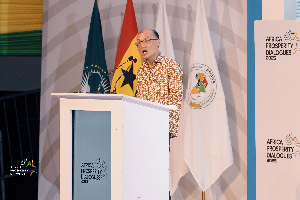Vice President of Imani Africa and technologist Bright Simons has stated that the justification of the Electoral Commission of Ghana (EC) that the old register contains names of unqualified persons so must be discarded for a new one is a plain absurdity.
The Electoral Commission of Ghana (EC) explained to the Supreme Court that, in essence, the current register contains names of noncitizens and therefore a new register will do away with the noncitizens given its(EC) inability to rid the register of these noncitizens.
But Mr Simons, who has been opposed to the EC’s decision to compile the new register, has rejected the argument as absurd.
“The justification they gave is simply that, in the past, voter identification cards could be acquired without one having to show material proof of citizenship, and consequently, because of this laxity, a “chain of provenance” problem has emerged. In simple terms, people who may not have been constitutionally entitled to a Voter ID card ended up getting one anyway. In subsequent registration exercises, such persons, it is speculated, proceeded to use the same cards to acquire new ones. Since no records exist today of who these individuals might be, the EC is urging the court to assume that they could be in such numbers as to render the entire register substantially unconstitutional.
“Unconstitutionality” in this case is a consequence of the EC being unable to confine the right to vote to citizens, as the constitution enjoins, as a result of a register so flawed that it does not equip them to satisfactorily police the citizenship-eligibility of voters.
My firm conclusion after carefully examining that logic is the untenability of any attempt to uphold the “chain of provenance” argument without eventually succumbing to plain absurdity,” he wrote on his blog.
Mr Simons added that “Even ignoring the obvious fact that people who may have registered without proof of citizenship in a previous electoral cycle may have subsequently acquired such proof, besides the Voter ID card they secured previously, and used this new proof in the subsequent registration exercises, the fact remains that it is the duty of the EC to identify such individuals and deal with them appropriately without disturbing the rights of non-infringing voters on the roll. After all, voting is about individual not collective eligibility. But there are graver concerns about the whole logic.”
Mr Simons then explained further why the EC’s justification is unjustified:
“The first exhibit in the argument I am going to present is the image of the Ghanaian passport application form below.
It should be clear even from a cursory scan that, historically, the administrative determination of what qualifies as proof of citizenship in Ghana has been maximalist. The authorities have always viewed the matter as one to be settled by inquiry instead of established by forensic investigation.
The process has typically involved a request to the applicant to bring “some documents” that can help the Authority in question come to “a reasonable determination” whether the applicant is more likely than not to be a citizen.
The open-ended nature of the range of documents historically allowed, from employment and school ID documents to “other ID cards”, suggests an effort to be inclusive rather than exclusive.
That can only be the reason why the Passport Authorities have been inclined for many decades now to accept such a wide range of documents. The principal goal has been to reduce false negatives and not to maximise true positives, simply because the harm of excluding a true citizen from exercising their rights exceeds the harm of allowing a non-citizen to enjoy those rights.
That, indeed, has for most of modern national life been the general principle of civil identification, empirical evidence of which abounds in the sheer numbers of so-called “illegal migrants” around the world versus the number of wrongly denationalised citizens.
To allow Ghanaian passports to be used to register for electoral purposes, when they are founded on such liberal grounds, and then to refuse to accept existing Voter ID cards amounts to patent absurdity.
From the way passport eligibility has been administratively defined, one could well use a Voter ID card to acquire one in principle. Or one can use the Voter ID card to register at a school and then use the school ID card to register for the passport, which then presumably qualifies one to be registered as a voter in the new dispensation created by the truly obnoxious CI 26 law passed today by Parliament to outlaw use of birth certificates and existing Voter ID cards. Because, alas, chain of providence logic never holds up to scrutiny.
Worse still, this law allows prospective registrants to “prove” their citizenship (not “identity”, mind you) by the mere attestation of two registered voters. As if some magical process exists through which attestation can transform someone not meeting the “origin” rules of Ghanaian ancestry required for citizenship into a Ghanaian. Talk of metaphysics! More on this obnoxious law in subsequent posts.
For now, suffice it to say that the circular illogicality foisted on the electoral process by CI 126 emanates from the view that, somehow, “contamination” of the electoral roll can be adequately cured by fiat at one level of civil identification, the electoral. Of all the flaws bedeviling such logic, this is the most pernicious.
A weakness at any point in any chain of identification does in fact enable an individual to obtain one document which leads to another until eventually they have the “right document” for some specific purpose. This is why some have argued that multipurpose ID cards tend to be more robust generally than single-purpose cards, like the Voter ID.
Chain of provenance” logic, as championed by the EC, would almost always become a servant, and never the cure, of absurdity, because administrative rules never stay static. One can always go back to some arbitrary point in the past when the rules or their enforcement differed from the present. There are people who are citizens of Ghana merely because they were born before a certain year, for instance. No amount of back-auditing would have anything useful to say about their status, and any suggestion that a civil register must aim for genealogical perfection before it can meet basic civil needs can thus only be absurd.
The only means of preventing the criminal acquisition of citizenship rights, in light of the above, is effective general law enforcement, not civil identification.
It is the duty of the Police and Immigration authorities to implement measures for the prevention and determent of criminal gangs and other unscrupulous individuals from attempting to exploit the rightfully liberal civil identification regime for whatever ends.
This duty cannot be neglected by the right agencies, only to be transmuted into a metaphysical search for fool-proof, perfect-origin, documents for the gratification of the civil identification authorities.
Civil identification is not by its nature hinged on archival investigation and genealogical evidence, upon which an absolute emphasis on origin-based citizenship must ultimately rests.
The philosophy of civic identification in general is, rather, to be focused on being able to assign a cluster of records to an individual. Far more important is this objective in most serious societies than is the conclusive determination of an individual’s history.
Accurately linking the records of an individual to their identity would, of course, require some level of security and authentication to preserve the integrity of whichever process that record-ascription is meant to achieve, but wherever and whenever breaches become rampant enough to undermine the overall effectiveness of the intended objective, it is the law enforcement authorities that are equipped to tackle the problem not the custodians of civil registers.
For example, there are latex devices that can enable the forging of fingerprints.
Theoretically, a voter with the right technological savvy can impersonate a whole host of people with this technology and by so doing beat biometric barriers to overvoting. No civil identification measure can stop this.
It is the province of the Police and the other security and intelligence services to address such organised attacks on the integrity of the electoral system, or any other civil process. Any attempt to devolve all that burden to civil identification and registration bodies is bound to fail.
And when such entities abandon the time-tested due process principle of “proportionality” and go for high-handed, blunderbuss, measures to force into being a delusional notion of perfection, they end up undermining the very integrity they claim they are seeking to protect.
The Ghanaian EC’s declared intent of using registration tools and policies, now backed with law, to achieve a goal properly domiciled in the domain of general security and law enforcement is thus seriously misguided and will not lead to an outcome that edifies Ghana’s democratic credentials.”
General News of Friday, 12 June 2020
Source: mynewsgh.com

















